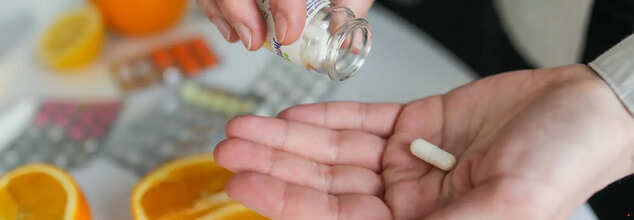
Credit: Canva
Tongue Scraping Is Trending—But It Could Turn Lethal For Your Heart
Tongue scraping has become a global trend in dental hygiene. Popularised by social media influencers, this particular dental practice has seen a 54.6% surge in Google searches over the last five years, all thanks to its marketing. However, experts are now sharing serious warnings about the growing popularity of tongue scraping. They have argued that it can create small, invisible cuts in tongue tissue, allowing bacteria direct access to the bloodstream. For someone with a heart valve issue, this could potentially lead to endocarditis, which has a mortality rate between 15 and 30%.
Patients with heart valve issues should be particularly cautious about any oral care tools that could introduce bacteria into the bloodstream. As per experts, these tools could also pose risks to people with abnormal cardiac valves, pacemakers, or other intravascular devices.
10-30% Of Americans Tempted To Try Tongue Cleaners
Despite the risks, many people turn to tongue scrapers in hopes of eliminating bad breath. "Statistics collected over the past decade show between 10–30% of Americans report bad breath and may be tempted to try tongue scrapers marketed as a solution," Loveland said.
However, he warned that aggressive scraping to remove food debris could do more harm than good. In some cases, patients have reportedly developed severe infections shortly after beginning regular tongue scraping. One such report came from Prince Charles Hospital in Australia.
UCLA Health experts have also cautioned against the trend, stating that “brushing or scraping the tongue adversely affects the numbers and diversity of the oral microbiome,” which could potentially lead to health problems like hypertension.
Loveland also raised concerns about tongue scrapers giving users a false sense of security. "These [issues] need professional assessment and treatment, not just masking symptoms with a tongue scraper,” he said. "If bad breath persists, consider consulting a dental professional rather than self-treating with tongue scrapers.”
Not Everyone Is Against Tongue-Cleaners
Not all experts agree, though. Some, like Cleveland Clinic dental hygienist Tenika Patterson, see value in the practice. “Tongue scraping can do a better job at removing that plaque and bacteria off the tongue’s surface,” Patterson said. “Brushing is OK to do, but think about it this way — if your carpet is dirty and you scrub it, the dirt’s going to get embedded down in there. But if you scrape it, it’s going to come right off the surface.”
Studies also suggest that tongue scraping may be more effective than brushing alone when it comes to reducing bacteria and eliminating bad breath.
Still, Loveland recommends a gentler, more traditional approach. “For those concerned about tongue health, gently brushing your tongue with your toothbrush after you’ve finished cleaning your teeth provides adequate cleaning without the risks associated with scrapers,” he advised.
'It is much safer than a rigid scraper as softer bristles are less likely to cause trauma to the delicate tissues, while still removing food particles and dead cells that may contribute to bad breath." He concluded by stressing the basics: brush your teeth twice daily, floss regularly, and schedule routine dental check-ups for optimal oral health.

Credit: Canva
UK Recalls Common Blood Pressure Drug Over Packaging Error
Patients taking a widely used blood pressure drug are being advised to verify their medication after a batch was recalled due to incorrect dosage information printed on the packaging. According to the Medicines and Healthcare Products Regulatory Agency (MHRA), some packs of lercanidipine, manufactured by Recordati Pharmaceuticals, have been wrongly labelled as containing 10mg tablets, when in fact they contain 20mg tablets.
Over 7000 Packs Are Subject To Recall
More than 7,700 packs already distributed are now subject to the recall, the MHRA has confirmed. Patients who may have the mislabelled medication are being urged to contact their GP, pharmacist, or call NHS 111 for advice. The NHS warns that consuming an excessive dose of lercanidipine can lead to symptoms such as dizziness and drowsiness. The MHRA issued the alert on Thursday after being informed by the Italian pharmaceutical company Recordati that the error was confined to a single batch of lercanidipine, which was initially distributed on April 10. The recalled packs carry the batch number MD4L07 and are marked with an expiry date of January 2028.
Although the front of the affected packs displays the incorrect strength, the correct 20mg dose is printed on the blister strips inside and on the side of some of the boxes. The MHRA advises patients who have been prescribed the 20mg dose to check the blister packaging to ensure they have received the correct medication. However, those prescribed 10mg tablets should seek immediate medical attention if they have this batch.
As a temporary measure, the MHRA suggests that patients who cannot reach a healthcare provider may take half of a 20mg tablet until they receive professional guidance. Dr Alison Cave, the MHRA’s chief safety officer, stated: "Healthcare professionals such as pharmacists are also being asked to stop supplying medicine from the affected batch and to return it to the supplier." She encouraged anyone experiencing suspected side effects to report them through the MHRA’s Yellow Card scheme.
In a statement to the BBC, a spokesperson for Recordati said the company is "working proactively" with the MHRA and will contact all customers who might have received the affected batch. “We are investigating the root cause and continue to work with our partners to isolate the issue and minimise disruption to our patients. Patient safety remains our top priority,” the spokesperson added.
What Do We Know About Lercanidipine?
Lercanidipine is used in the treatment of Angina (heart-related chest pain), Hypertension (high blood pressure), Arrhythmia, hypertensive emergency, subarachnoid haemorrhage and anal fissure. According to the NHS, it is one of the four types of blood pressure medicines sold across the UK. These pills are a calcium channel blocker. That means it regulates blood pressure by relaxing blood vessels and reducing pressure on them, thereby making it easier for the heart to pump more blood throughout the body. In this way, it normalises the blood pressure in patients with high blood pressure.
ALSO READ: RFK Jr.'s Autism Controversial Comments Face Backlash From Parents And Medical Experts

RFK Jr.'s Autism Controversial Comments Face Backlash From Parents And Medical Experts
Robert F. Kennedy Jr., the U.S. Secretary of Health and Human Services, is facing strong backlash after making sweeping comments during a recent press conference regarding autism and its supposed causes. As the CDC released a report revealing a rise in autism diagnoses among U.S. children now affecting 1 in 31 8-year-olds Kennedy doubled down on discredited theories linking autism to environmental exposures and vaccines, while portraying the disorder in stark, stigmatizing terms.
His remarks including claims that children with autism “will never hold a job,” “never pay taxes,” or “never use a toilet unassisted”, were swiftly condemned by parents, medical experts, and advocacy groups alike for reinforcing outdated stereotypes and misrepresenting the broad and diverse autism spectrum.
Autism spectrum disorder (ASD) is not a single condition with uniform symptoms or outcomes. Rather, it is a neurological and developmental condition characterized by challenges in social interaction, communication, and repetitive behaviors. The key word is "spectrum" and it exists for a reason.
Some individuals with autism may be nonverbal and need lifelong support, while others live independently, excel in careers, write books, or even hold public office. “Autism is not a disease,” said actress and autism advocate Holly Robinson Peete in a video statement, responding to Kennedy. “It is a developmental difference and it is important to get that right.”
Her son, RJ, diagnosed 25 years ago, has “shattered a lot of 'never' off that list,” she said, referring to Kennedy’s grim portrayal. Countless parents echoed this sentiment on social media, stating that Kennedy’s generalizations erase the lived realities, milestones, and accomplishments of their children.
CDC Data Shows a Rise in Diagnoses
The CDC’s Autism and Developmental Disabilities Monitoring (ADDM) Network reported that 1 in 31 8-year-olds in the U.S. were diagnosed with autism in 2022, compared to 1 in 54 in 2016. But experts stress that this increase is not necessarily cause for alarm. It is, in fact, a sign of progress.
The rise in autism rates is driven largely by improved awareness, broader diagnostic criteria, and increased access to evaluations and services. We are identifying children earlier and more accurately that’s a good thing.
Kennedy, however, rejected this explanation as “indefensible” and announced plans for a directive to the National Institutes of Health to investigate “environmental exposures” as the root cause — reigniting long-debunked concerns about vaccines and toxins.
Despite overwhelming scientific consensus debunking any link between vaccines and autism, Kennedy has long been associated with promoting vaccine hesitancy. His latest comments, veiled in language about “environmental exposures,” once again hint at this discredited narrative.
Leading medical organizations, including the American Academy of Pediatrics and the World Health Organization, have repeatedly emphasized that vaccines are safe, effective, and have no causal relationship with autism. Resurrecting these claims only spreads fear and confusion. It undermines public health and harms autistic people by framing their existence as a preventable tragedy.
Parents Demand a Shift in the Narrative
Perhaps the strongest rebuke came from parents of autistic children themselves. Samantha Taylor, whose 20-year-old son is on the spectrum, told Good Morning America, “Autism doesn’t destroy families misinformation does.” In a viral Facebook post, she added, “What truly causes damage is the relentless portrayal of autism as something catastrophic, rather than a different way of experiencing the world.”
Kennedy’s comments, they say, not only ignore the complexity of the condition but strip children of their dignity and potential.
“Statements like ‘they’ll never write a poem’ deny the creative genius that so many autistic individuals demonstrate,” said Peete. “It’s dangerous, it’s harmful, and it’s simply false.”
Experts Call for More Informed Leadership
While Kennedy has promised answers by September through federally backed studies, medical experts warn that his rhetoric may set back years of advocacy and research by framing autism as an “epidemic” akin to an infectious disease.
Autism is not something to be eradicated, it’s something to be understood, supported, and embraced. Families deserve resources, not fearmongering.
In the last two decades, the medical community has shifted toward neurodiversity — a perspective that recognizes neurological differences like autism as natural variations of the human genome. This philosophy emphasizes inclusivity, respect, and strength-based approaches rather than medicalizing difference.
At a time when public trust in institutions is fragile, the words of public officials matter deeply. Kennedy’s comments have triggered a reckoning not only about how autism is portrayed in the media and politics but also about how society chooses to value — or devalue — people who are different.
Advocates stress the need for policies rooted in science, not stigma, and for leadership that uplifts rather than marginalizes.
As the national conversation around autism continues, one thing is clear: the autism community — parents, children, adults on the spectrum, clinicians, and allies — is not going to stay silent in the face of outdated narratives.

Credits: Canva
World Liver Day: How A Timely Liver Transplant Saved A 30-Year-Old Man
On World Liver Day, which is observed on April 19, to spread awareness about liver health and the life-saving power of organ donation, let us look at one such real-life story. This is where doctor's prompt's action and one's selfless donation saved one human's life.
When the 30-year-old Delhi-based man walked into the hospital, he had yellow eyes and dangerously high liver enzymes. He was admitted in Max Super Speciality Hospital, Patparganj. That moment, he rarely knew that his life was, in fact, hanging by a thread. The man was diagnosed with acute liver failure, which was caused by viral hepatitis. His body was slowly shutting down. The frequency of his body shutting down had increased. The doctors also quickly informed the family. This was the one last hope of survival - a liver transplant.
The First Option Failed
His sister was family's first ray of hope. She was also willing and had a compatible liver whose part of it could be donated. However, pre-surgery tests revealed that her liver size was too small to ensure a safe transplant. The family then proposed the patient's brother-in-law - a second-degree relative, as the next donor. His liver was a better match, but since he was not an immediate blood relative, there had to be special regulatory approvals which were required.
However, the worsening condition of the patients allowed no such time.
The hospital too scrambled to get clearance for the brother-in-law. All this while, the patient suffered a cardiac arrest. The situation turned dire within minutes. Doctors performed CPR to revive him. He was immediately put on ventilator support. The decision had to be taken soon.
A Miraculous Surgery
With no time in hand, the doctors decided to go ahead with the sister as the donor, though there were risks there too.
A team of highly skilled hepatobiliary surgeons, anesthesiologists, and critical care specialists took over. In a high-risk, nine-hour surgery, they removed the patient’s failing liver and replaced it with part of his sister’s.
“This was one of the most challenging cases we’ve handled,” said Dr. Ajitabh Srivastava, Director – HPB Surgery & Liver Transplant. “When the patient collapsed, our team acted within seconds. Every decision, every move mattered. His survival was truly a team triumph.”
The patient is now recovering well.
What Is A Liver Transplant?
As per the National Institute of Diabetes and Digestive and Kidney Diseases, a liver transplant is a surgical procedure to replace a diseased liver with a healthy one from a donor. It’s often the last resort when liver failure occurs—whether due to chronic illness or sudden injury.
When Is It Needed?
People may need a liver transplant for:
- Alcoholic liver disease
- Fatty liver disease (NASH)
- Cirrhosis due to chronic hepatitis C
- Liver cancer with cirrhosis
- Acute liver failure (often due to drug overdose, hepatitis, or toxins)
Types of Liver Transplants
Deceased Donor Transplant:
The most common type, where a full or partial liver is taken from someone who has recently died.
Living Donor Transplant:
A healthy person donates a portion of their liver—typically a close relative. Both the donor’s and recipient’s liver regenerate to normal size in a few weeks.
What Must Be Kept In The Mind?
- Matching and Compatibility: Blood type, liver size, and health are crucial.
- Approval Process: Especially important for non-blood relatives.
- Recovery and Monitoring: Post-op care involves lifelong medication, lifestyle changes, and regular check-ups.
© 2024 Bennett, Coleman & Company Limited

